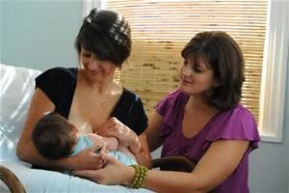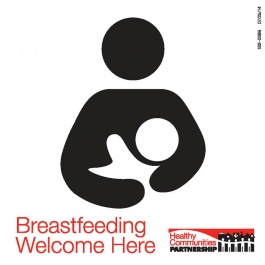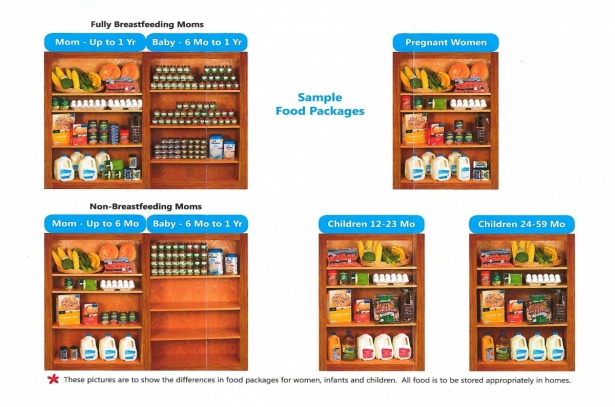Women, Infants, and Children (WIC)
 Women, Infants, and Children (WIC)
Women, Infants, and Children (WIC)
WIC focuses on keeping families healthy through improved nutrition. This is a federally funded supplemental food program for pregnant women, breastfeeding women, infants and children up to age 5. Breastfeeding support, education, and promotion are a main focus in starting infants on the path to good health. WIC emphasizes breastfeeding due to its health and immunity building benefits. Additionally, WIC provides education to participants and clients receive a variety of healthy foods based upon federal nutritional priorities. These may include whole grains, dairy, fruits, vegetables, proteins, baby foods and supplemental infant formula.
Breastfeeding Peer Counselor-PC
 When you need someone to talk to about breastfeeding, we are here for you. Our PC is available both during and after work hours. The PC can answer your questions, listen to your concerns, encourage, support, educate, and help you be successful at breastfeeding. A breastfeeding peer counselor is someone just like you. She lives in our community, has participated in the WIC program, and has breastfed.
When you need someone to talk to about breastfeeding, we are here for you. Our PC is available both during and after work hours. The PC can answer your questions, listen to your concerns, encourage, support, educate, and help you be successful at breastfeeding. A breastfeeding peer counselor is someone just like you. She lives in our community, has participated in the WIC program, and has breastfed.

WIC Clinic Schedule
Monday - Friday: 8:00AM - 4:30PM (Closed between 12:00PM - 1:00PM for lunch)
Late hours are available on the third Thursday of every month, by appointment only.
Call the W.I.C. program for more information and eligibility requirements: (217) 735-2317
This institution is an equal opportunity provider.
|
INCOME GUIDELINES |
|||||
|
JULY 1, 2024 to JUNE 30, 2025 |
|||||
|
GROSS INCOME |
|||||
| FAMILY SIZE |
ANNUAL |
MONTHLY | TWICE-MONTHLY |
BI-WEEKLY |
WEEKLY |
| 1 | $27,861 | $2,322 | $1,161 | $1,072 | $536 |
| 2 | $37,814 | $3,152 | $1,576 | $1,455 | $728 |
| 3 | $47,767 | $3,981 | $1,991 | $1,838 | $919 |
| 4 | $57,720 | $4,801 | $2,405 | $2,220 | $1,110 |
| 5 | $67,673 | $5,640 | $2,820 | $2,603 | $1,302 |
| 6 | $77,626 | $6,469 | $3,235 | $2,986 | $1,493 |
| 7 | $87,579 | $7,299 | $3,650 | $3,369 | $1,685 |
| 8 | $97,532 | $8,128 | $4,064 | $3,752 | $1,876 |
| Add for each additional family member | +$9,953 | +$830 | +$415 | +$838 | +$192 |

In accordance with Federal civil rights law and U.S. Department of Agriculture (USDA) civil rights regulations and policies, the USDA, its Agencies, offices, and employees, and institutions participating in or administering USDA programs are prohibited from discriminating based on race, color, national origin, religion, sex, disability, age, marital status, family/parental status, income derived from a public assistance program, political beliefs, or reprisal or retaliation for prior civil rights activity, in any program or activity conducted or funded by USDA (not all bases apply to all programs). Remedies and complaint filing deadlines vary by program or incident.
Persons with disabilities who require alternative means of communication for program information (e.g., Braille, large print, audiotape, American Sign Language, etc.) should contact the State or local Agency that administers the program or contact USDA through the Telecommunications Relay Service at 711 (voice and TTY). Additionally, program information may be made available in languages other than English.
To file a program discrimination complaint, complete the USDA Program Discrimination Complaint Form, AD-3027, found online at How to File a Program Discrimination Complaint and at any USDA office or write a letter addressed to USDA and provide in the letter all of the information requested in the form. To request a copy of the complaint form, call (866) 632-9992. Submit your completed form or letter to USDA by: (1) mail: U.S. Department of Agriculture, Office of the Assistant Secretary for Civil Rights, 1400 Independence Avenue, SW, Mail Stop 9410, Washington, D.C. 20250-9410; (2) fax: (202) 690-7442; or (3) email: program.intake@usda.gov.
USDA is an equal opportunity provider, employer, and lender.
Family Case Management
Who is Eligible?
- Women, infants, and children
Program Includes:
- Referrals for medical care throughout your pregnancy and delivery
- Visiting nurses
- Individual education and counseling with a nurse
- Referral to community resources
- Family planning counseling after delivery
- High risk infant follow-up

Child Health
- Childhood immunizations
- High Risk infant follow-up
- text4baby (Free weekly text health tips)
- The Illinois Division of Specialized Care for Children
